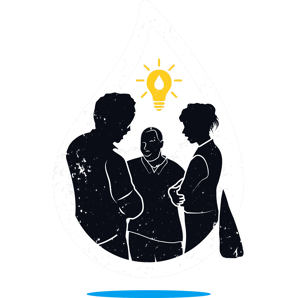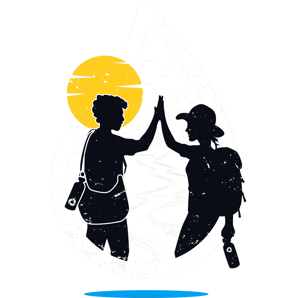We support utilities in becoming self-reliant and transparent, with strong local ownership and clear responsibilities to deliver sustainable and trusted water services.
- Homepage
- Services
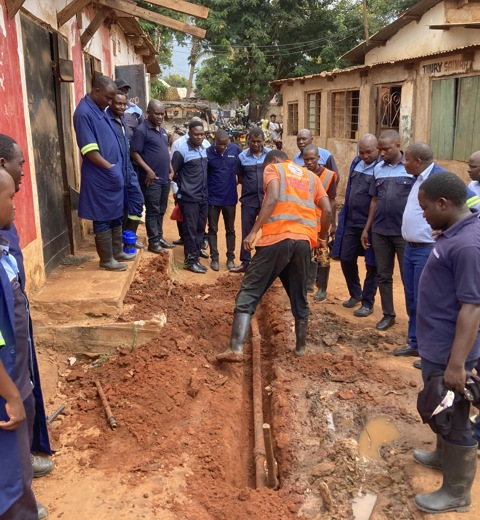
Capacity building
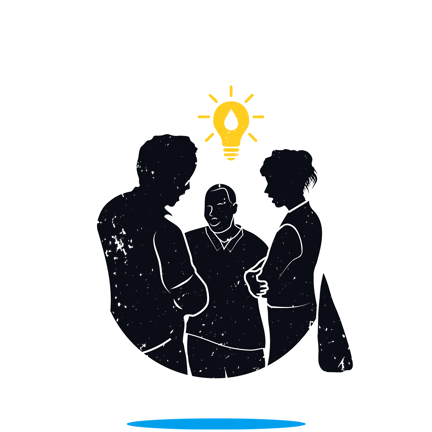
Partnering for stronger water operators
4 Critical Success Factors (CSF)
At World Waternet, our mission is clear: to regenerate water cycles by empowering local water operators. We do this through long-term Water Operators' Partnerships (WOPs) that combine capacity building, innovation, and collective action. Our services support our partners to become self-sustaining, resilient and future-proof.
We measure our impact by strengthening what we call the Maturity Level of our WOPs—this reflects how well a local water organisation can deliver clean, safe, and sufficient water services for all.
To help partners level up, we focus on four critical success factors:
Autonomous governance & accountability
Integrated Water Resources Management
We promote a holistic approach that safeguards the full water cycle, balances human and ecosystem needs, and fosters cooperation between upstream and downstream users.
Operational efficiency
We improve operational efficiency by aligning utilities with international standards, strengthening procedures, and optimising asset management to ensure reliable and sustainable water services.
Financial Sustainability
We strengthen financial sustainability by reducing water losses, ensuring fair tariffs, and improving investment and procurement so utilities can maintain and expand reliable services.
Services
Key expertise in capacity development
Integrated Water Resources Management
Water cycle management takes a holistic view of freshwater as a finite resource, balancing human needs, ecosystems, and upstream–downstream users. It safeguards quality, regulates flows, and builds resilience through coordinated policies and sustainable practices.
Our way of working is cycle-wide: we support utilities from catchment to tap, and back into nature.
From source to sewer and back to nature, we work alongside utilities to ensure safe water and resilient sanitation. By renewing infrastructure and safeguarding quality at every step, we make WASH services reliable, sustainable, and future-ready.
Extreme weather strains water services, from flash floods to droughts and soil erosion. We help utilities build green and grey infrastructure that safeguards supply while reducing future risks, keeping water services resilient and ecosystems protected
We invest in ecosystems as one of the strongest ways to manage water. By restoring and protecting nature, local communities gain self-reliant, adaptive solutions that safeguard water, enhance biodiversity, and tackle societal challenges sustainably.
We restore wetlands, plant trees for water retention, rehabilitate rivers, and support community-led ecosystem projects that strengthen water management and biodiversity.
Many utilities depend on downstream catchments, but sedimentation and desertification reduce water capacity and strain production. We employ agroforestry, plant native trees, remove invasive species, and engage local communities, creating self-reliant solutions that protect water resources while delivering lasting social and ecological benefits.
Collaboration is at the heart of our work, so we bring together experts and private partners to develop tailored IWRM solutions for our local WOPs. For example, the BluElephant, a compact micro-membrane wastewater plant, was co-designed and piloted in the West Bank, transforming wastewater into reusable water while demonstrating innovative public private collaboration.
Data and Infomation Management
We use Geographic Information Systems (GIS) as the backbone of water utility management. Mapping assets and networks allows us to optimise operations, plan maintenance, and detect leaks or unpaid connections. By visualising data across the system, utilities can reduce non-revenue water and make informed decisions that keep water flowing efficiently and sustainably.
Going hand in hand with a complete map of the water system, sensors embedded across water networks provide real-time insights into flow, pressure, and quality. Continuous monitoring uncovers anomalies early, optimises operations, and prevents losses. Turning data into actionable intelligence helps utilities enhance reliability and improve service to communities.
Online training modules deliver consistent knowledge on operations, asset management, and digital tools. Staff can build skills at their own pace, improving decision-making and supporting long-term operational efficiency. Structured learning contributes to reducing non-revenue water and strengthening utility capacity.
Drinking water
Maintaining clean and safe tap water requires continuous monitoring, treatment, and adherence to standards. Ensuring water quality protects public health and builds trust between utilities and communities. We help our partners reach and maintain standard operations procedures in water treatment and delivery.
Although not always highlighted in discussions, the economic dimension of the water sector is crucial. An efficient system with minimal losses, where all connections are accounted for, illegal connections can be quickly identified, and leakages promptly repaired, leads to stronger returns for water utilities. Beyond building credibility with users, this enables utilities to cover maintenance costs, replace outdated infrastructure, and expand their operations.
Reducing Non-Revenue Water begins with a clear understanding of the water system. Through GIS mapping, World Waternet supports partners in visualising and analysing their networks. This is a necessary first step towards establishing District Meter Areas (DMAs), which are designated zones used to measure water loss. By comparing inflows and outflows, utilities can pinpoint leaks and unpaid connections. To support this, we also deliver training on specialised equipment, such as flow meters.
Another dimension of Non-Revenue Water is social. Often, it is not that customers are unwilling to pay, but that utilities fail to account for them or record their consumption. We therefore support our partners in conducting door-to-door interviews to rebuild customer databases. Alongside this, standardised procedures are developed to scale training within partner countries, using a train-the-trainer model.
For many low-income families, the dream of safe water at home is blocked by one hurdle: the high cost of connection to the grid. Subsidies can ease this first step, but doubts remain. Will these households be able or willing to pay their bills over time?
At World Waternet, we see things differently. Every family deserves access to resilient water services, and with the right approach, communities can thrive. By co-creating fair pricing models and working with Water Resource Users Associations (WRUAs), we make sure new connections last. Families are not just connected, they are empowered to sustain their services for the long run.
A solution that tackles both NRW and low-income connections? Prepaid water kiosks.
Prepaid water kiosks offer clean, affordable water to communities without household connections. The model secures revenue for long-term maintenance while reducing non-revenue water. In Tanzania, for example, World Waternet and MORUWASA introduced kiosks that now provide a sustainable alternative to unsafe sources and costly private vendors.
Sewage
Managing sewage safely often begins with the basics. World Waternet has donated vacuum trucks and trained local teams to operate them effectively. These trucks provide a safe alternative to unsafe manual collection, ensuring wastewater is removed and transported for proper treatment. Training builds long-term capacity and improves health in communities.
Aging or damaged sewer pipes often lead to leakages, blockages, and untreated discharges into the environment. World Waternet supports utilities in assessing their networks, planning repairs, and carrying out renewals. By combining technical expertise with on-the-job training, local teams gain the skills to maintain and upgrade infrastructure.
Managing wastewater requires strict safety standards, as sewer networks often contain hazardous gases such as hydrogen sulphide and methane that can be toxic or explosive. World Waternet equips utility teams with the knowledge and tools to work safely, from protective equipment to modern monitoring techniques. In Jordan, for example, we trained wastewater crews to detect gas concentrations before opening manholes, ensuring safer working conditions and building long-term resilience in operations.
Efficient and resilient wastewater treatment starts with strong plant design and operational know-how. World Waternet supports partners in optimising treatment processes, improving reliability, and maintaining water quality. In Ethiopia, collaboration with local utilities involved assessing plant layouts, training operators, and introducing process optimisations to ensure treated water meets safety standards while reducing operational losses.
World Waternet can and has also taken charge of the design of construction of new wastewater treatment plants.
Nature-based Solutions can also help manage wastewater. Constructed wetlands offer a cost-effective way to clean water naturally. Salt-tolerant plants (halophytes) filter out solids, absorb nutrients, and support microbes that break down pollutants. This solution is scalable and largely self-sufficient, though regular maintenance is needed, with local communities taking responsibility for its care.
SMART Agricultural
Many utilities depend on downstream catchments, but sedimentation and desertification reduce water capacity and strain production. We employ agroforestry, plant native trees, remove invasive species, and engage local communities, creating self-reliant solutions that protect water resources while delivering lasting social and ecological benefits.
We invest in ecosystems as one of the strongest ways to manage water. By restoring and protecting nature, local communities gain self-reliant, adaptive solutions that safeguard water, enhance biodiversity, and tackle societal challenges sustainably.
We restore wetlands, plant trees for water retention, rehabilitate rivers, and support community-led ecosystem projects that strengthen water management and biodiversity.
Extreme weather strains water services, from flash floods to droughts and soil erosion. We help utilities build green and grey infrastructure that safeguards supply while reducing future risks, keeping water services resilient and ecosystems protected
Awareness
Connecting water professionals across regions allows sharing of lessons, innovations, and solutions. Mentorship and peer exchanges foster collaboration, improve technical and managerial capacity, and create lasting networks for resilient water utilities.
Engaging stakeholders through structured strategies ensures inclusive decision-making and community buy-in. In our projects we apply an Open system approach in which the input of all stakehoolders is crucial. This facilitates dialogue, align priorities, and promote transparent communication between utilities, communities, and local business to act in the the best common interest. This means protecting waterways, through collective action and mutual accountability.
Raising awareness of operational standards and procedures enhances staff performance. Training and regular feedback loops embed best practices, reduce errors, improve service delivery, and strengthen efficiency across water utilities.
Diversity, Equity & Inclusion
Women have always been at the heart of water management. In Burkina Faso, for example, they carry the daily responsibility of securing water for their households. Yet, they are too often underrepresented and unrecognised in decision-making processes. That is why our projects begin with baseline studies, helping us to understand the social realities within our partner countries and to promote equitable representation for all.
Young people are also frequently excluded from water management. By actively engaging women and youth, we work to create a more balanced and inclusive approach that strengthens communities and ensures sustainable water governance.
We believe that some of the most powerful ideas can come from the youngest voices. That is why we make it a priority to involve young water professionals in projects and decision-making.
This happens at different levels: from supporting young experts through the Young Expert Programme, to organising awareness campaigns and school competitions on water topics. By engaging youth early on, we help shape the next generation of water leaders.
